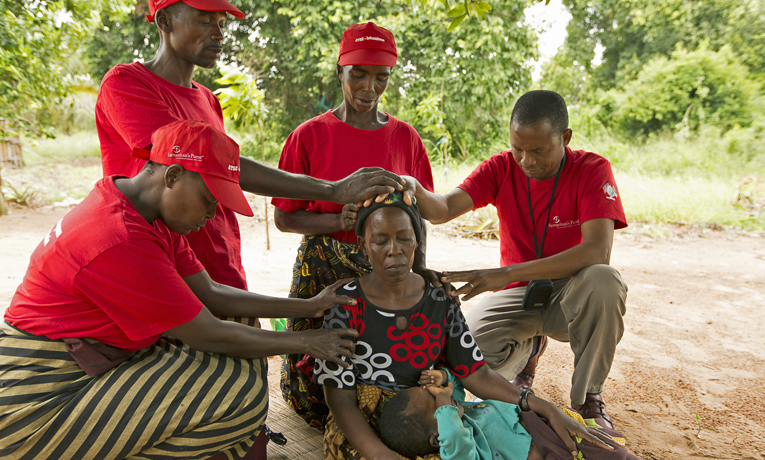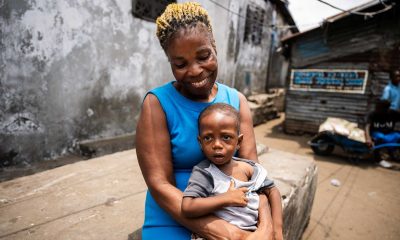Samaritan’s Purse is battling the disease in Mozambique through education and teaching God’s Word
The specter of HIV/AIDS might not dominate the headlines the way it once did, but it remains a worldwide problem. In Mozambique, the latest statistics show that slightly more than 15 percent of the population is infected. Many areas where Samaritan’s Purse works have a rate of 20 percent or more.
DonarSamaritan’s Purse is combatting the disease from a threefold perspective in Mozambique. We start by teaching prevention, we continue the program by testing and counseling, and, finally, we train HIV victims to compassionately care for others with the disease.Family Matters Program
During the first phase of our work, we train local Christians to teach a program called Family Matters, a course designed to teach parents how to talk to their children about abstinence, fidelity, expectations, and God’s Word. The class is intended not only to prevent sexually transmitted infections in youth but also to help parents communicate with their children about any problems they may have.
“When you are open with your child, and your child can trust you, it seems he can talk about everything,” said Tania Loforte, a Samaritan’s Purse employee in Mozambique. “It’s easy for you to sit and read the Bible together and give him the opportunity to share what he’s thinking, what he’s understanding about one verse, and from there you can talk about everything.”
 During the class, the trainer ties family issues into Bible verses. The parents learn how to discuss problems with their teenagers from a biblical perspective. The instructors are people from the same villages as the people they’re teaching. The training they receive from Samaritan’s Purse is helping them in their own lives.
During the class, the trainer ties family issues into Bible verses. The parents learn how to discuss problems with their teenagers from a biblical perspective. The instructors are people from the same villages as the people they’re teaching. The training they receive from Samaritan’s Purse is helping them in their own lives.
“It’s very important because I’m a father, and I was facing this challenge in my own life,” said Alberto Marrima, one of the trainers in the Family Matters Program. “I didn’t know how to deal with sexual related things before because my parents didn’t teach me. Now I can use exactly this subject to [teach] my family.”
During the class, many of the men and women are excited to share how they are dealing with changes with their children. One woman in a red suit raised her hand several times to share about her daughter.
“When we are speaking, she talks about her dreams in the future, what goals she wants,” Gloria Fernanda said. “In days that are coming, I think she is going to be a good woman because of this.”
Before the class, Gloria was closed off from her daughter and didn’t show her much attention. Now she realizes how important it is to have a relationship with her children. Other women like Gloria have started raising their children differently, and she sees how it will benefit the entire community.
“I’m so glad because since I’m here in this class, I’ve learned a lot, and I think [with] this knowledge I’m going to help my family first and then the community and make our community better,” she said.
Community Counseling and Testing
Although Samaritan’s Purse is working from the root level to stop the spread of HIV, programs like Family Matters won’t help those who may already have the disease. For those people, we have a program called Community Counseling and Testing.
 We train volunteers to test people in areas that don’t have easy access to a hospital. For 30 days, the volunteers live in the community where they are testing. They counsel those who are HIV positive, especially if one spouse is infected and the other is not. They also offer rides to the health center so people can get the care they need. This program is intended to prevent the spread of the disease and educate people.
We train volunteers to test people in areas that don’t have easy access to a hospital. For 30 days, the volunteers live in the community where they are testing. They counsel those who are HIV positive, especially if one spouse is infected and the other is not. They also offer rides to the health center so people can get the care they need. This program is intended to prevent the spread of the disease and educate people.
For people like Francisco Bambamba, the program has been crucial. He had a headache and felt weak while in a meeting at work. He fell, and his colleagues rushed him to the hospital. But doctors in Mozambique are often undertrained, so they diagnosed him with malaria. He returned home immediately.
“The day I fell down, I came back and thought it was malaria,” he said. “But here in the community were two guys from Samaritan’s Purse. They found me when I was resting in the shade, and they made me do the test. They found out I [have] HIV. I had to go to health center.”
A doctor from the Democratic Republic of Congo works at the health center in Jungamo. It’s several miles from many of the communities where Samaritan’s Purse does testing, but still closer than the hospital. When we take people to the center, they’re able to receive medical care.
“I’m so happy because if we are alone, we cannot do everything,” Dr. Kambombgo said. “So when organizations like Samaritan’s Purse comes to help us, we can together work so that we can help the community. I’m so happy because of that help.”
Samaritan’s Purse is helping to prolong lives by correctly diagnosing people through the testing, giving them medicine, and providing transportation to the health center.
“If it was not [for] Samaritan’s [Purse], I think now I would be dead,” Francisco said. “I was very, very sick.”
Sustainable Home-Based Care
Eventually people with HIV/AIDS can no longer stay entirely healthy, and lifestyles in Mozambique often speed the process of the disease. The disease is debilitating, and can quickly result in death for those who don’t have anyone to care for them. That’s where Sustainable Home-Based Care comes in.
 Samaritan’s Purse has organized a group of infected people into an association. The association has various animal and agriculture projects to raise money. They work in the garden, keep bees, and take care of the animals themselves. They use that income from the projects to care for those in their group who are already too sick to fend for themselves, and often they are able to help those people become stronger.
Samaritan’s Purse has organized a group of infected people into an association. The association has various animal and agriculture projects to raise money. They work in the garden, keep bees, and take care of the animals themselves. They use that income from the projects to care for those in their group who are already too sick to fend for themselves, and often they are able to help those people become stronger.
“They can see every day that if you accept the treatment, if you accept to go to the hospital, if you accept Jesus in your life, you will be able to live for a long, long time to be able to take care of your kids,” Loforte said. “This disease is not the end.”
The group not only cares for the people within their community, but they also encourage them to go the hospital to receive proper care. They also train family members to care for the sick person.
“The volunteer is there for a couple of hours, but the family is all the time with the patient, so we focus on the family so that the family can help the patient with moral and spiritual aspects,” said Jorge Chicatse, the program coordinator.
When Carolina Manuel was diagnosed with HIV, she thought she lived too far from the hospital to receive any treatment. She stayed at home, nearly dead, and thought there was no hope. But then she met a member of the association.
“One of the members came to my house and they took me to the hospital,” she said. “When I got there, they advised me to be a member of this group.”
She joined and learned how to take care of herself and other people. As she got healthier, she began teaching others in the community about the importance of caring for themselves.
“I’m so happy because this program saved my life,” she said. “I see that this program comes from the Lord. I am a believer, and I learned that when you go to visit someone who is sick we first pray because God is first and He can take care of everything and He looks after us.”
Hope in Christ
There’s a common tie through all of the programs,. During Family Matters, the trainers teach through a biblical perspective. In Community Counseling and Testing, volunteers pray with and teach the beneficiaries. And in Sustainable Home-Based Care, the volunteers pray each time they visit the sick and train their family members to be spiritually supportive.
“For us at Samaritan’s Purse, it’s an opportunity to share with them the hope in Jesus Christ,” Loforte said.
As we continue battling HIV/AIDS and work diligently to lower the number of infected people, please pray that our ministry would be effective and totally transform the lives of the people who so desperately need it. Through education and the power of Christ, we are working to make lives in Mozambique longer and healthier.






